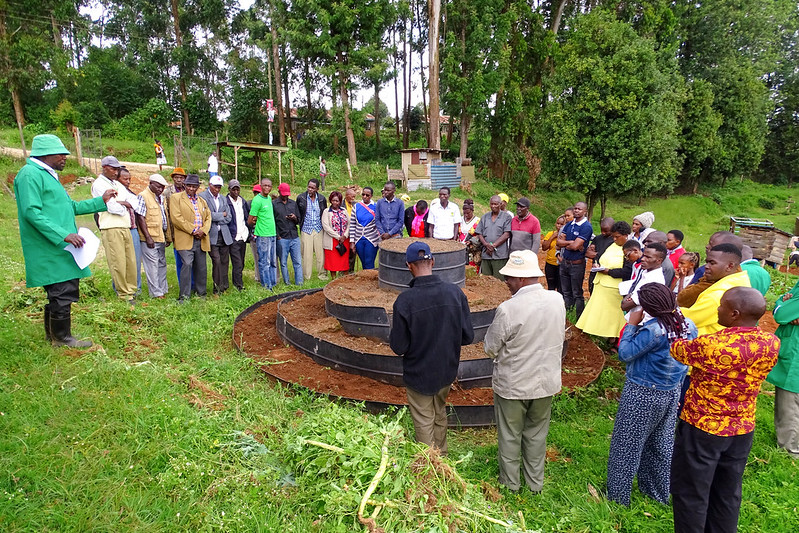In line with global trends, Kenya has seen a significant temperature increase of 0.3°C to 0.6°C per decade, impacting key sectors like agriculture and water resources. This rapid warming trend was a major focus at the inaugural Africa Climate Summit (ACS23) in Nairobi in September, and will no doubt spur Africa’s unified climate agenda ahead of the 28th United Nations (UN) climate change conference (COP28) taking place in November in the United Arab Emirates (UAE).
Current initiatives to drive climate change action
The September 2023 Africa Food Systems Forum in Dar es Salaam, Tanzania, stressed the urgent need for climate-responsive solutions by African governments to address the continent’s food system challenges.
Kenya’s President, Dr William Ruto, has since come through on his promise to explore greener and more environmentally friendly fertilisers alongside a 10-year initiative to grow 15 billion trees by 2032. This initiative would raise Kenya’s tree cover to 30 per cent, enhancing carbon sequestration, restoring 5.1 million hectares of deforested areas and benefiting households as 30 per cent of these trees are set to be fruit, nut and fodder species.
President Ruto has also banned single-use plastic bags and initiated trials for biodegradable tubing bags in line with a United Nations resolution from UNEA 5.2. Meanwhile, Kenya is at the forefront of climate change efforts in Africa, with the Climate Change Act of 2016, and recent amendments to enhance its carbon market regime, driving its responses. The government is also actively implementing the third cycle of the National Climate Change Action Plan (NCCAP III) to promote low-carbon, climate-resilient development.
Sustainable solutions
Yet even as we celebrate these great interventions, we must recognise that climate change is a complex issue that no single country can solve independently. A collaborative approach involving partnerships across national governments, the private sector and the international community is required for rapid transformation.
Thankfully, African leaders are focusing their development strategies on sustainable solutions at both the national and continental levels. The Africa Environment Action Plan, the Africa Clean Energy Corridor and the Africa Renewable Energy Initiative all indicate the continent’s strategic commitment to addressing the climate crisis. The actions proposed in these initiatives were restated in the Nairobi Declaration, which summed up the outcomes of the ACS23. Africa’s common position on food systems will benefit from cross-sectional collaboration to ensure resource efficiency and high-impact transformation.
The Declaration comprises 23 commitments, primarily addressing policy areas related to investment attraction, economic development with a focus on youth empowerment, enhanced continental cooperation, increased renewable energy financing, support for small-scale farmers and the expedited implementation of the African Union Climate Change and Resilient Development Strategy and Action Plan (2022-2032).
Notably, the Declaration emphasises the need for global collaboration to secure adequate capital for both development and climate initiatives, echoing the principles of the Paris Agreement for People and the Planet, which aims to ensure that no country must choose between its development goals, climate action and the basic human right to feed people.
Capitalising on momentum
The time is now for environmental, energy and food systems experts to resolutely come together to help the continent fight hunger and land degradation and ensure economic prosperity,
Africa is capitalising on the momentum of ACS23 and the AFS Forum 23 to prioritise its climate discussions and facilitate decision-making areas most critical to Africa on the global front. This was evident at the September UN General Assembly (UNGA) where Africa’s key concerns were a common theme in discussions, such as transitioning to a low-carbon economy, improving living standards and building resilience to climate shocks, especially for rain-fed agricultural nations.
Coming off the challenges of the COVID-19 pandemic, which exposed vulnerabilities globally, there is a strong focus on fast-tracking climate action and development, as was emphasised by Africa’s delegation at UNGA.
Stronger collaboration against climate change
Countries across the African continent are up against a huge task: the need to transform food systems to feed people, to rehabilitate and safeguard the environment and to ensure resilience to shocks caused by climate change. There is no doubt that African leaders are more committed than ever before to building on the lessons of the recent crises that the continent has faced to deliver stronger resilience for people, the environment and the economy. Certainly, this is not an easy undertaking and will require stronger collaboration.
AGRA has also developed a suite of transferable assets in technology, system-strengthening partnerships and models that can benefit women, youth and smallholder farmers in Kenya and across the continent. Collaborating with the Kenyan government, like-minded institutions and the private sector can help to unlock potential in Kenya and across the continent.
With a shared vision and united mission leveraging stronger collaboration across sectors and countries, the world can pave the way for growth, prosperity and lasting change in Kenya and across the globe.
Header image: ©2022 CIAT/Owen Kimani





Comments
How does Kenya plan to implement its 10-year initiative to grow 15 billion trees by 2032, and what environmental and socioeconomic benefits does the country expect to achieve through this initiative, particularly in terms of carbon sequestration and ecosystem restoration?
Visit us telkom university